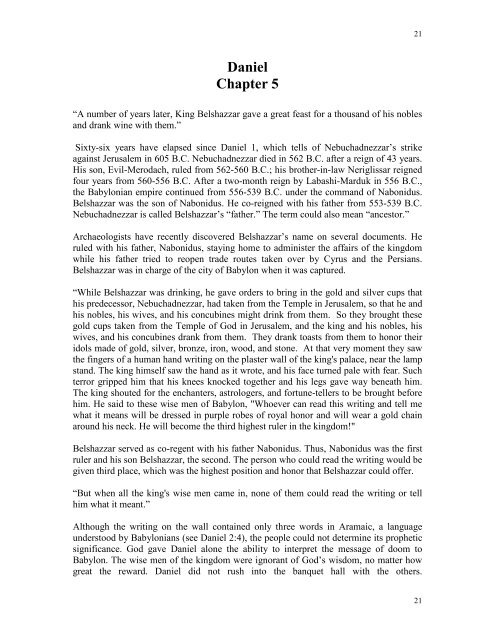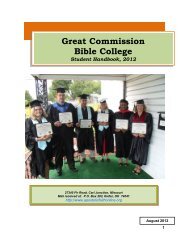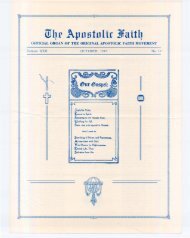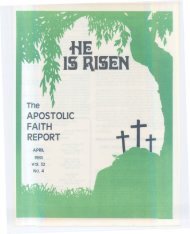Your Daniel Ebook for this lesson - Apostolicfaithonline.org
Your Daniel Ebook for this lesson - Apostolicfaithonline.org
Your Daniel Ebook for this lesson - Apostolicfaithonline.org
Create successful ePaper yourself
Turn your PDF publications into a flip-book with our unique Google optimized e-Paper software.
21<br />
<strong>Daniel</strong><br />
Chapter 5<br />
“A number of years later, King Belshazzar gave a great feast <strong>for</strong> a thousand of his nobles<br />
and drank wine with them.”<br />
Sixty-six years have elapsed since <strong>Daniel</strong> 1, which tells of Nebuchadnezzar’s strike<br />
against Jerusalem in 605 B.C. Nebuchadnezzar died in 562 B.C. after a reign of 43 years.<br />
His son, Evil-Merodach, ruled from 562-560 B.C.; his brother-in-law Neriglissar reigned<br />
four years from 560-556 B.C. After a two-month reign by Labashi-Marduk in 556 B.C.,<br />
the Babylonian empire continued from 556-539 B.C. under the command of Nabonidus.<br />
Belshazzar was the son of Nabonidus. He co-reigned with his father from 553-539 B.C.<br />
Nebuchadnezzar is called Belshazzar’s “father.” The term could also mean “ancestor.”<br />
Archaeologists have recently discovered Belshazzar’s name on several documents. He<br />
ruled with his father, Nabonidus, staying home to administer the affairs of the kingdom<br />
while his father tried to reopen trade routes taken over by Cyrus and the Persians.<br />
Belshazzar was in charge of the city of Babylon when it was captured.<br />
“While Belshazzar was drinking, he gave orders to bring in the gold and silver cups that<br />
his predecessor, Nebuchadnezzar, had taken from the Temple in Jerusalem, so that he and<br />
his nobles, his wives, and his concubines might drink from them. So they brought these<br />
gold cups taken from the Temple of God in Jerusalem, and the king and his nobles, his<br />
wives, and his concubines drank from them. They drank toasts from them to honor their<br />
idols made of gold, silver, bronze, iron, wood, and stone. At that very moment they saw<br />
the fingers of a human hand writing on the plaster wall of the king's palace, near the lamp<br />
stand. The king himself saw the hand as it wrote, and his face turned pale with fear. Such<br />
terror gripped him that his knees knocked together and his legs gave way beneath him.<br />
The king shouted <strong>for</strong> the enchanters, astrologers, and <strong>for</strong>tune-tellers to be brought be<strong>for</strong>e<br />
him. He said to these wise men of Babylon, "Whoever can read <strong>this</strong> writing and tell me<br />
what it means will be dressed in purple robes of royal honor and will wear a gold chain<br />
around his neck. He will become the third highest ruler in the kingdom!"<br />
Belshazzar served as co-regent with his father Nabonidus. Thus, Nabonidus was the first<br />
ruler and his son Belshazzar, the second. The person who could read the writing would be<br />
given third place, which was the highest position and honor that Belshazzar could offer.<br />
“But when all the king's wise men came in, none of them could read the writing or tell<br />
him what it meant.”<br />
Although the writing on the wall contained only three words in Aramaic, a language<br />
understood by Babylonians (see <strong>Daniel</strong> 2:4), the people could not determine its prophetic<br />
significance. God gave <strong>Daniel</strong> alone the ability to interpret the message of doom to<br />
Babylon. The wise men of the kingdom were ignorant of God’s wisdom, no matter how<br />
great the reward. <strong>Daniel</strong> did not rush into the banquet hall with the others.<br />
21






